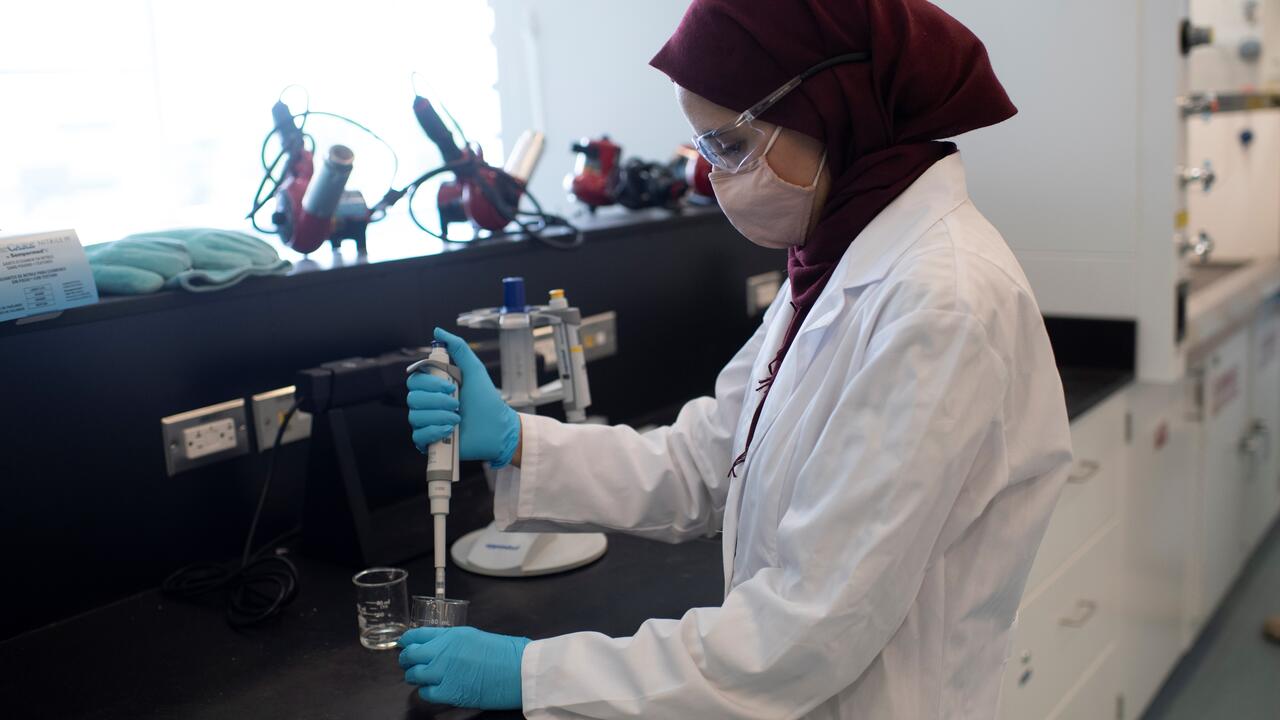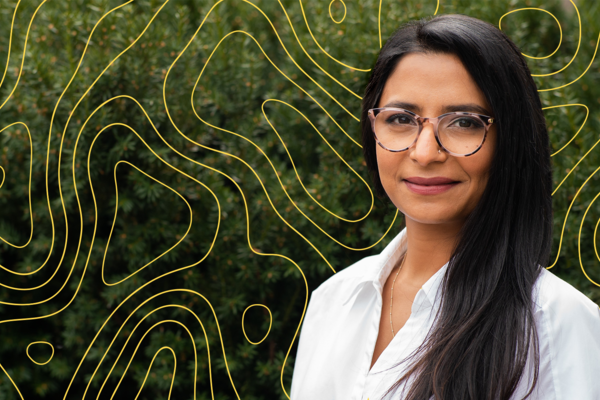
These seven Waterloo alumni are making history for women in STEM
Kick off National Women's History Month with seven alumni breaking barriers in STEM

Kick off National Women's History Month with seven alumni breaking barriers in STEM
By Amy Suresh (BSc in progress) Current student, Office of Advancement co-opThe University of Waterloo is proud to support a strong community of innovators, entrepreneurs and leaders — many of whom are women.
In honour of Women’s History Month in Canada, we are shedding light on a few alumni who are making outstanding contributions to the fields of STEM. Keep reading to find out how they are making headlines, building community and driving innovation.
Many workplaces have processes set in store to accommodate employees whose work lives are impacted by a health condition. Despite affecting 1 in 6 Canadian couples, infertility isn’t one of them.

Alongside her colleague Serena Sohrab, Nada Basir launched the Infertility and Work Lab, where she explores the mental and physical effects of infertility on women in the workforce and identifies gaps in organizational practices that can be redefined to provide women with a more supportive environment. Read Nada’s story in the spring 2022 issue of Waterloo Magazine.
Two years after completing her PhD, Chekema Prince was awarded $25,000 for her startup — a step in the right direction when it comes to uplifting diverse voices in the technology space. Today, she acknowledges that it’s still rare to see other entrepreneurs like her: Black, female, and an engineer.
Chekema believes that learning is key, which is why she became a mentor and coach to young students who wanted to take a similar entrepreneurial route, particularly in the tech industry. Read about her journey from student to successful entrepreneur and the role diversity plays in overcoming obstacles.
Rachel’s initial pitch for her startup, Hyivy, was a little unconventional — she was in the hospital awaiting treatment for cervical cancer when she proposed the idea to her radiologists (spoiler alert: they loved it).
Rachel wanted to develop a solution to help women that were recovering from pelvic diseases, which often result in pain and discomfort during intimacy. Her own experience with cancer showed her just how few rehabilitation options there were for women suffering with similar conditions, most of which were painful or uncomfortable. She developed a more ergonomically appropriate device, allowing women to do rehab at home and track their progress using real-time data reported straight to their doctors.
As a queer Black woman in physics, Chanda Prescod-Weinstein has experienced more than her fair share of hardships while trying to establish her presence in academia. Deeply affected by the mistreatment of minority groups both in and out of the workplace, Chanda channeled her anger into something powerful: Particles for Justice, a group of physicists advocating for change in STEM fields.

Chanda isn’t sure how many other Black women in her field received a PhD from Waterloo. She might have been the first. But one thing she does know is that things need to change. Read her story in Waterloo Magazine.
Ebele Mogo was only 14 years old when she began her undergraduate studies at Waterloo. Upon her arrival from her home country of Nigeria, she had to get used to more than just the cold winters.
Growing up with the ultimate goal of going into medicine, Ebele thrived in her studies, even making it on the Dean’s list. But despite her best efforts, she didn’t get accepted to medical school. Though the initial disappointment was difficult to overcome, Ebele quickly learned that she didn’t have to be a doctor to make a difference. She pivoted from medicine to global health, eventually becoming founder of the Engage Africa Foundation.
Though she’d always been passionate about living sustainably, Michelle Li didn’t expect to become a climate entrepreneur. After moving to London, where the options to go green seemed endless, she realized just how simple it was to make lifestyle changes that reduced her carbon footprint.

While there was tons of carbon literacy information out there, Michelle found it hard to digest for the average person. That marked the start of Clever Carbon, a non-profit organization delivering information about sustainability and reducing carbon footprints in a fun and engaging way. With colourful graphics, interactive quizzes and free resources for schools and workplaces, Clever Carbon is proof that being eco-friendly is easier than you think.
In 2014, Jean Creighton was given the opportunity of a lifetime — she was selected by NASA to fly aboard the astronomical observatory SOFIA.
Though she wasn’t able to pursue her childhood dream of becoming an astronomer due to her poor eyesight, she didn’t let it stop her from following her passion for science. She quickly realized that public outreach was something she enjoyed, especially when it came to educating others about the wonders of outer space. Her efforts were rewarded when she was chosen to serve as one of 24 Airborne Astronomy Ambassadors who would board the SOFIA.

Read more
Rico Mariani (BMath ’88) knows how challenging the tech industry can be — and even more so for women and members of other underrepresented groups. As part of his personal commitment to inclusion and equity, he created scholarships to encourage Waterloo students in these groups.

Read more
Swati Matta (BCS '10) started Koble to provide new and expectant parents with credible information and support.

Read more
As the only female in her secondary school computer science class, Elin Liu felt the pressure of representing women in STEM. A scholarship provided by donors Yves and Cynthia Bled gave her a boost of confidence. Now, she wants to help other female engineering students find their place in STEM.
The University of Waterloo acknowledges that much of our work takes place on the traditional territory of the Neutral, Anishinaabeg, and Haudenosaunee peoples. Our main campus is situated on the Haldimand Tract, the land granted to the Six Nations that includes six miles on each side of the Grand River. Our active work toward reconciliation takes place across our campuses through research, learning, teaching, and community building, and is co-ordinated within the Office of Indigenous Relations.